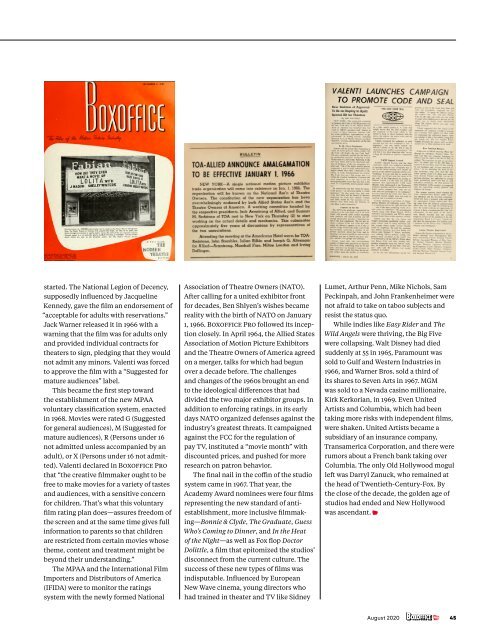Boxoffice Pro - August 2020
The Official Magazine of the National Association of Theatre Owners
The Official Magazine of the National Association of Theatre Owners
- No tags were found...
Create successful ePaper yourself
Turn your PDF publications into a flip-book with our unique Google optimized e-Paper software.
started. The National Legion of Decency,<br />
supposedly influenced by Jacqueline<br />
Kennedy, gave the film an endorsement of<br />
“acceptable for adults with reservations.”<br />
Jack Warner released it in 1966 with a<br />
warning that the film was for adults only<br />
and provided individual contracts for<br />
theaters to sign, pledging that they would<br />
not admit any minors. Valenti was forced<br />
to approve the film with a “Suggested for<br />
mature audiences” label.<br />
This became the first step toward<br />
the establishment of the new MPAA<br />
voluntary classification system, enacted<br />
in 1968. Movies were rated G (Suggested<br />
for general audiences), M (Suggested for<br />
mature audiences), R (Persons under 16<br />
not admitted unless accompanied by an<br />
adult), or X (Persons under 16 not admitted).<br />
Valenti declared in <strong>Boxoffice</strong> <strong>Pro</strong><br />
that “the creative filmmaker ought to be<br />
free to make movies for a variety of tastes<br />
and audiences, with a sensitive concern<br />
for children. That’s what this voluntary<br />
film rating plan does—assures freedom of<br />
the screen and at the same time gives full<br />
information to parents so that children<br />
are restricted from certain movies whose<br />
theme, content and treatment might be<br />
beyond their understanding.”<br />
The MPAA and the International Film<br />
Importers and Distributors of America<br />
(IFIDA) were to monitor the ratings<br />
system with the newly formed National<br />
Association of Theatre Owners (NATO).<br />
After calling for a united exhibitor front<br />
for decades, Ben Shlyen’s wishes became<br />
reality with the birth of NATO on January<br />
1, 1966. <strong>Boxoffice</strong> <strong>Pro</strong> followed its inception<br />
closely. In April 1964, the Allied States<br />
Association of Motion Picture Exhibitors<br />
and the Theatre Owners of America agreed<br />
on a merger, talks for which had begun<br />
over a decade before. The challenges<br />
and changes of the 1960s brought an end<br />
to the ideological differences that had<br />
divided the two major exhibitor groups. In<br />
addition to enforcing ratings, in its early<br />
days NATO organized defenses against the<br />
industry’s greatest threats. It campaigned<br />
against the FCC for the regulation of<br />
pay TV, instituted a “movie month” with<br />
discounted prices, and pushed for more<br />
research on patron behavior.<br />
The final nail in the coffin of the studio<br />
system came in 1967. That year, the<br />
Academy Award nominees were four films<br />
representing the new standard of antiestablishment,<br />
more inclusive filmmaking—Bonnie<br />
& Clyde, The Graduate, Guess<br />
Who’s Coming to Dinner, and In the Heat<br />
of the Night—as well as Fox flop Doctor<br />
Dolittle, a film that epitomized the studios’<br />
disconnect from the current culture. The<br />
success of these new types of films was<br />
indisputable. Influenced by European<br />
New Wave cinema, young directors who<br />
had trained in theater and TV like Sidney<br />
Lumet, Arthur Penn, Mike Nichols, Sam<br />
Peckinpah, and John Frankenheimer were<br />
not afraid to take on taboo subjects and<br />
resist the status quo.<br />
While indies like Easy Rider and The<br />
Wild Angels were thriving, the Big Five<br />
were collapsing. Walt Disney had died<br />
suddenly at 55 in 1965, Paramount was<br />
sold to Gulf and Western Industries in<br />
1966, and Warner Bros. sold a third of<br />
its shares to Seven Arts in 1967. MGM<br />
was sold to a Nevada casino millionaire,<br />
Kirk Kerkorian, in 1969. Even United<br />
Artists and Columbia, which had been<br />
taking more risks with independent films,<br />
were shaken. United Artists became a<br />
subsidiary of an insurance company,<br />
Transamerica Corporation, and there were<br />
rumors about a French bank taking over<br />
Columbia. The only Old Hollywood mogul<br />
left was Darryl Zanuck, who remained at<br />
the head of Twentieth-Century-Fox. By<br />
the close of the decade, the golden age of<br />
studios had ended and New Hollywood<br />
was ascendant.<br />
<strong>August</strong> <strong>2020</strong><br />
45

















